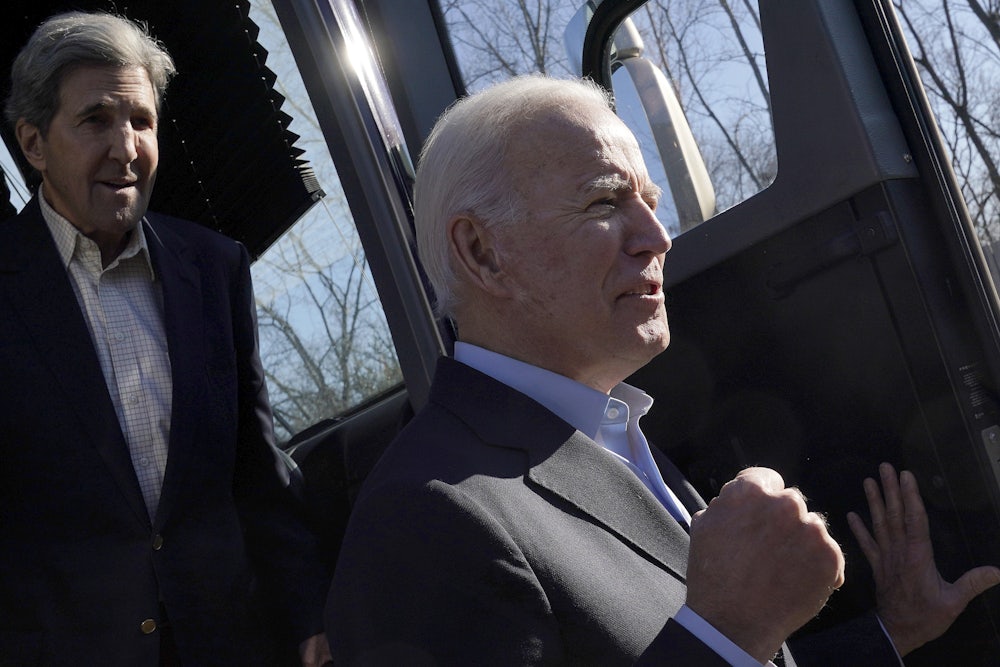Twelve years ago this week, Barack Obama’s pick of Hillary Clinton for secretary of state had everyone in Washington reading (or claiming to read) Team of Rivals, Doris Kearns Goodwin’s book on Abraham Lincoln’s feuding Cabinet. Judging from his initial choices, Joe Biden’s Cabinet and White House staff can best be described as a Team of Adults.
What is striking about Biden’s band—from designated Secretary of State Antony Blinken to the widely expected choice of Janet Yellen to run the Treasury Department—is how experienced and noncontroversial they are. Almost all of them have worked closely with Biden over the years. Even more unusual, none of them carry reputations as prima donnas.
This is not a moment for on-the-job training or the hope that an unorthodox selection would grow in office. A pandemic, a stalled economy, and a scorched-earth defeated president have left Biden with no room for maneuver or error. Nearly three vital weeks were lost because of General Services Administrator Emily Murphy’s unprecedented refusal to give Biden’s team access to normal transition resources, from official briefings to expedited security clearances. She finally yielded Monday after Michigan certified its 16 electoral votes for Biden.
As a group, Biden’s nominees have been chosen for their ability to glide through the Senate even with Republican Mitch McConnell as majority leader. In fact, all of Biden’s picks for Cabinet-level posts have been confirmed by the Senate for prior jobs. Biden avoided making waves with Susan Rice at the State Department, which would have given rise to another debilitating round of right-wing Benghazi conspiracy talk, or Senator Elizabeth Warren at the Treasury, which would have aroused bitter opposition from Wall Street.
It is hard to think of a political parlor game more foolish than guessing Cabinet-level picks weeks in advance. As near as I can tell, no one had Alejandro Mayorkas on their game card for Homeland Security or Linda Thomas-Greenfield circled for UN ambassador. But both the Cuban-born Mayorkas and longtime career diplomat Thomas-Greenfield won plaudits for their prior service in the Obama sub-Cabinet, as did Avril Haines, the first woman named as director of national intelligence.
Perhaps the two most intriguing choices are Yellen, the chair of the Federal Reserve under Obama, and John Kerry, a former secretary of state, as Biden’s climate envoy. Both in their seventies, Yellen and Kerry could have easily spent the twilight of their careers giving speeches and gracing global conferences. Instead, following the example of 78-year-old Biden, both of them have signed on for the 16-hours-a-day rigors of government service at a time of crisis.
The bonds between Biden and Kerry are particularly tight, since the two men were Senate colleagues for almost a quarter century. In addition, Kerry was poised to name Biden as his secretary of state had the Massachusetts Democrat won the 2004 presidential race. It is this relationship that prompts the hope that Kerry will have real clout as a presidential special envoy for climate with Cabinet-level rank on the National Security Council.
In contrast to Trump’s ego-mad war with the world, the Biden administration would place its faith in diplomacy. Kerry played a key role in negotiating the Paris Agreement, and Jake Sullivan, the incoming national security adviser, was a lead architect of the 2015 Iranian nuclear deal under Obama.
While Trump and Secretary of State Mike Pompeo continue to threaten military action against Iran, Biden and his appointees are committed to negotiations to restore a version of the agreement. Asked about Iran at the Aspen Security Forum in August, Blinken replied, “If Joe Biden’s elected president ... he would seek to build on the nuclear deal to make it longer and stronger if Iran returns to strict compliance.”
No one who studied Biden closely over the years should be surprised by the ideological tenor of his initial appointments. Biden is a centrist Democrat with a finely developed political antenna that permits him to move to the left when public opinion shifts. It is why Biden was faster than Obama and many other Democrats to support gay marriage. The Kerry appointment appears to indicate that Biden is serious about his commitment to battling climate change, since it is unlikely that the former senator would have been lured back to the government to serve in a fig-leaf role.
Even in normal times—that is, any moment in American history that does not involve Trump—presidential transitions have been fraught with controversy. George H.W. Bush, the consummate Washington insider, failed to get John Tower, his choice for defense secretary, through the Senate. Bill Clinton, devoid of Washington experience, had two picks for attorney general implode before he turned to Janet Reno. And George W. Bush’s ill-fated 2004 nomination of Bernie Kerik (a Rudy Giuliani crony and former New York police commissioner) for secretary of Homeland Security eventually led to Kerik being sentenced to four years in prison for tax fraud and lying to government officials. Earlier this year, the president—showing Trumpian mercy—pardoned Kerik.
Given this bipartisan history of confirmation problems, Biden may not be able to staff the Cabinet and the rest of the administration without some unexpected scandal or setback. And there is no way of telling how McConnell would react if Biden makes a pick heavy with irony and comeuppance, such as Merrick Garland for attorney general. But so far, Biden has played the appointments game with masterful skill. It is not every president who can lure both a former Fed chair and former secretary of state back to government. Biden, in the favored cliché about presidential transitions, has hit the ground running. The stakes are too high—for American democracy, indeed the world—for him to stumble.
